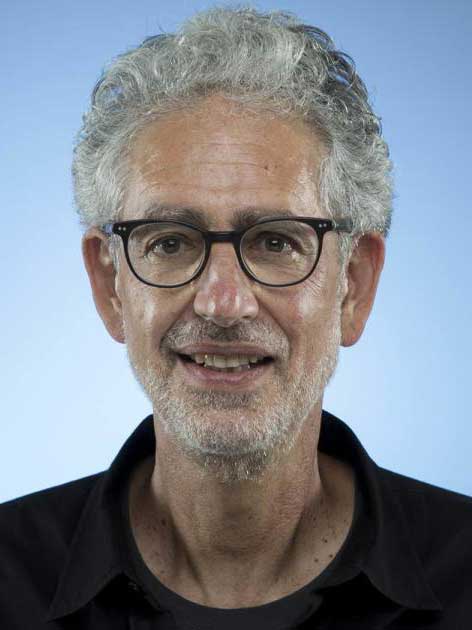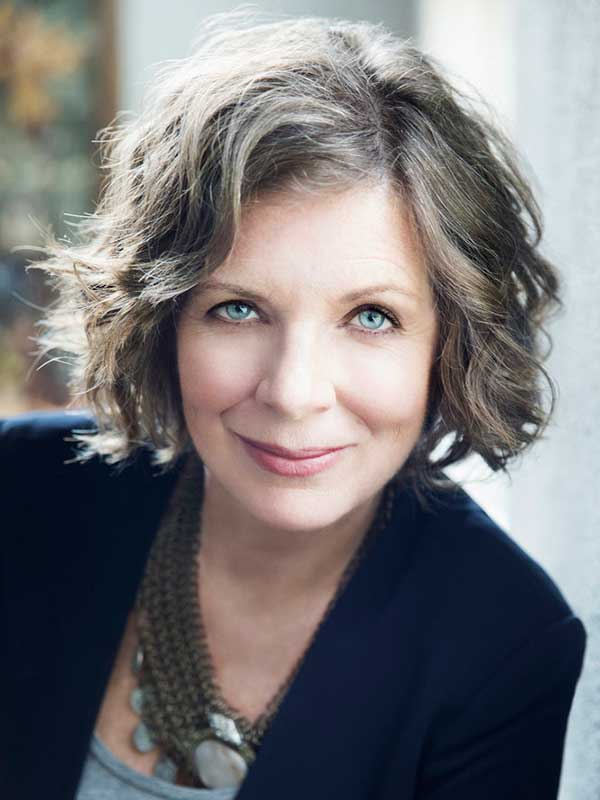By:
- Anthony King
Published Date
By:
- Anthony King
Share This:

From left: Anthony Davis, John Adams, Daniel Bernard Roumain, Thulani Davis and Michael Korie. All courtesy photos.
How Can Opera Give Voice to a New Narrative?
Industry leaders explore the role and responsibility artists have in pushing for social change
Five of the world’s most renowned composers and lyricists gathered for a virtual UC San Diego event March 6, outlining how they envision the role of opera in advancing equality and social justice.

Moderator Mark Swed. Courtesy photo.
Representing the present and future of the genre, composers Anthony Davis, John Adams and Daniel Bernard Roumain, and librettists Thulani Davis and Michael Korie spoke candidly about the struggle for representation and equity in their industry, and the responsibility artists have to bring about change—sometimes even subversively.
Los Angeles Times classical music critic Mark Swed moderated the talk, which was organized by the Arts and Community Engagement initiative in the Division of Arts and Humanities. He called the two-hour discussion a “historical document,” one that he had never witnessed in this way before.

Professor of Music Susan Narucki. Photo by Lisa-marie Mazzucco.
“We place the arts at the center of essential conversation, sparking cultural dialogue and civic engagement,” said Susan Narucki, a professor in the Department of Music and director of Arts and Community Engagement. “Opera is at a particularly interesting moment, one in which we're asking broader questions of the performing arts in general: who's welcome on the stage and in the audience? Whose stories can, and should, be told?”
Anthony Davis, a professor in the Department of Music, said he has seen a resurgence of politically minded work, spurred in part by the Black Lives Matter movement and killing of George Floyd in 2020. His most recent opera “The Central Park Five” won the 2020 Pulitzer Prize for Music, and adds to a long list of social- and racial-conscious work that includes “Amistad” (1997) and “X, The Life and Times of Malcolm X” (1986).
“Because Malcom X is such a revered figure in our community … we felt the real responsibility in telling that story, [and to] tell it in a way that would also resonate with the community,” he said, acknowledging he often uses the past to illuminate who we are today as a society. “Something that we can do as composers is to give voice to these stories, and voice to these people.”
Thulani Davis wrote the libretto for “X” and “Amistad” and said they were criticized at first for using opera, which originated in Europe, to tell these stories. A Grammy Award-winner, she is currently a professor and Nellie Y. McKay Fellow in the Afro-American Studies Department at the University of Wisconsin-Madison.
“Even though we were going to pains to tell the story in a certain kind of way, it was never clear to us that there would ever be any consensus around accepting the work,” she said, later explaining that the fight for racial equality has been a constant in her life. “I have no idea what effect the work’s going to have, but it’s [a] long-term struggle. … It is just incumbent upon me, I think, to create the work and see that it gets done.”
Adams, a force in contemporary classical composition whose operatic work includes “Nixon in China” (1987), “The Death of Klinghoffer” (1991) and “Doctor Atomic” (2005), recognized the panel was discussing two different concepts: one being opera as an art that addresses human experience, and the other being opera as a business, which includes companies and advisory boards that often control what gets produced and by whom.
But as a composer, he said, he writes for feeling.
“Art and particularly music—above and beyond, all music—is the art of feeling, of making people feel,” he said. “The bottom line is that we as composers are … in the position to create feeling, and that’s really what these operas are about. We use feeling to probe these emotions.”
There was back-and-forth talk about the role of the artist in speaking authentically for their characters, with Adams saying artists are able to take an “imaginative leap” in writing human drama, where personal identity does not play a significant role. Roumain, in contrast, expressed a great need for lived experiences influencing the genre today.
“I would not feel comfortable writing music … or trying to write music against a libretto that doesn’t come from the reality of the person, and the person’s experience,” Roumain said. Called the “next generation of composers” by Swed, Roumain’s “We Shall Not Be Moved” was named the best classical music performance of 2017 by the New York Times.
“I think that the reason why opera has changed so radically is because you had people like John and Anthony and Thulani and Michael, who were willing to do radical things and push the culture forward,” Roumain said. “I’m wanting to embrace that, pick up that mantle, do radical things and [also] push the culture forward.”
Korie at one point called this form of radical art “stealth opera,” where audiences that may be more conservative “think that they’re seeing something historical and ‘safe,’ and realize [that] it’s about today,” he said. Korie’s libretto to “The Grapes of Wrath” (1995) is a good example, as he said the Steinbeck adaptation was written as a comment about present-day immigration.
“The people that write these operas are drawn to these big ideas, and stories are what change people’s minds,” he said, calling opera the “most effective medium” to make social change because it mixes sound and poetry. “Opera doesn’t work the way theater works, or television works. You need to be direct.”
For the future, the panelists said they were grateful their older work was getting in front of new audiences. Korie’s “Harvey Milk” (1995) returns in a new 2022 production, and Anthony Davis and Thulani Davis’ “X” is being restaged by multiple companies. There was hope, too, for collaboration after the pandemic.
“I think there really is an opportunity now for us to think about endless possibilities, for us to really talk with one another and have an equal exchange of ideas,” Roumain said.
Division of Arts and Humanities dean Cristina Della Coletta established Arts and Community Engagement in late 2018, with Narucki the inaugural faculty director. Narucki—well versed in the impact of socially conscious opera, producing “Cuatro Corridos” (2013) and “Inheritance” (2018)—said, the arts help to understand the world.
“More than this,” Narucki said, “the arts can be a key element in bringing people from divergent viewpoints together to create vibrant communities, in which many voices are heard and welcomed, and society itself can be transformed.”
Share This:
You May Also Like
Stay in the Know
Keep up with all the latest from UC San Diego. Subscribe to the newsletter today.



